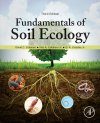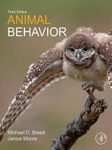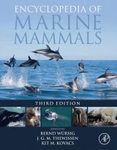Reviews of the second edition:
"This book is by highly respected authors on a very active subject [...] it will give an excellent education on soil organisms and their general behavior."
– P.B.H. Tinker, in Experimental Agriculture, Vol. 41, 2005
" [...] a very well written and organized book, with its major strength in stating the various topics as 'state of the art,' along with the authors' visions for the near future of soil ecology."
– Hector Causarano, Auburn University, in Vadose Zone Journal, 2005
"This updated and expanded edition will be useful as a textbook for students of soil ecology and scientists doing research in this field."
– Northeastern Naturalist
"This book, with new material and updates to the first edition, delineates more than any other single source, the subject matter and key questions in the field. It provides a wide ranging and, in nearly all cases, a thorough and up-to-date synthesis of both older and recent literature. The writing is erudite, yet with a clear and easy style, sprinkled with anecdotes that make for an engaging read [...] this is an excellent reference work for soil scientists and ecologists. The style and structure of the book is somewhere between that of a traditional text book and a literature review/monograph. While basic concepts and core knowledge are well laid out, the reader is invited to explore many diverse and sometime contradictory finding and to make their own interpretations and conclusions. Hence, the book is well suited as a thought provoking text for graduate students and as an essential desk reference for the working scientist in the field."
– Keith Paustian, Colorado State University, in Agricultural Systems
" [...] this book by Coleman, Crossley, and Hendrix is an eye-opener and a fascinating journey [...] Very simple and distinct illustrations further enhance the practicality and attractivity of this volume. The language is clear and concise, and conveys the fascination and dedication of the authors. This clarity is to be appreciated by every academic teacher and makes it fun reading. Essentially this book is both a primer and a wonderful textbook, which provides a much needed overview on soil ecology that is key to appreciating this fascinating environment and identifying what is needed to ensure soil well-being (for our own benefit). Fundamentals of Soil Ecology can be wholly recommended and should even be read by those who only occasionally deal with the soil system."
– Environmental Geology
"The authors of this book have, for many years, been at the forefront of the discipline of soil ecology. Indeed, their collective work has contributed significantly to the understanding of the udnerground world and has helped fuel the growing interest in this field of exploration [...] This book provides an excellent introduction to the field of soil ecology and is essential reading for any student or researcher with interest in the below ground world and the functioning of terestrial ecosystems. Indeed, it has all the traits of an excellent textbook: It is well written, richly illustrated, informative, through provoking, and well supported by a comprehensive and up-to-date literature base. What is unique about the book, in my view, is that it takes a truly holistic perspective to the study of soil ecology, highlighting the importance of the food web approach- emphasizing the central role of trophic interactions- and the role of soil as the organizing center for terrestrial ecosystems. The lead author and his coworkers are pioneers of this approach to soil ecology, and this book exemplifies their contribution to this field. I recommend this book strongly."
– Richard Bardgett, Institute of Environmental and National Sciences, Soil and Ecosystem Ecology, Lancaster University, in Bioscience
"Fundamentals of Soil Ecology by Coleman et al. is a thorough, well-researched presentation of current trends in soil ecology. This book is full of useful information; of particular value are discussions of lab and field methods, and future research needs in soil ecology. This book will be valuable for soil scientists and ecologists needing up-to-date information on soil organisms, food webs, and interactions with nutrient cycles. I highly recommend this book."
– Thomas L. Thompson, Professor of Soil Science, University of Arizona, U.S.A.
"The recommended text for my course on the ecology of soil organisms has just got better with the second edition of Fundamentals of Soil Ecology [...] this new edition retains the same engrossing read but even more information. The updated reference material, new sections and relevance to current events and, particularly, the practical exercises in the last chapter are most welcome. Coleman, Crossley and Hendrix have brought us a thorough review of a very fast evolving field of ecology [...] This book is timely in bringing our attention to soils as living entities that need to be conserved and managed judiciously. This book remains my choice of texts for students and would be recommended for anyone with an interest in soils at any level."
– John Dighton, Director, Rutgers University Pinelands Field Station, U.S.A.
"This well written, thoroughly updated edition supplies an excellent discussion of soil fauna while placing all the soil biota and their metabolism into a holistic, soil ecology context. The linkage of soil foodwebs and biodiversity to soil processes and global change nicely ties together the basic and applied aspects of these important concepts."
– Eldor Paul, Colorado State University, U.S.A. & Editor of Soil Microbiology and Biochemistry
"Three renowned experts in soil ecology contribute a needed addition to anyone interested in understanding the complex ecosystem beneath our feet. They bring together the most recent information on soil science, soil zoology and ecology, in a comprehensive, well-written book. Adding laboratory and field experiments as a final chapter assures that all students, young and old, can continue to explore the organisms in this hidden world. For everyone wanting an in depth appreciation of the fascinating creatures and their role in soils, this book is a must read!"
– Diana Wall, Professor and Director, Natural Resource Ecology Laboratory, Colorado State University, U.S.A.
"This book provides a balanced and comprehensive perspective on the multi-disciplinary nature of soil ecology that spans from the physical and chemical characteristics of the soil as a habitat to the impact that soil communities have on ecosystem function [...] Traditional and contemporary methods for extraction, enumeration and identification of all major phyla in soils of forest, desert, agricultural and grassland ecosystems are described both conceptually and as research protocols approachable to scientists ranging in expertise from novice to experts. The tables and figures provide a synthesis of literature and graphic illustration of concepts that is invaluable in self-learning and instruction in both formal and informal settings."
– Deborah Neher, Soil Ecologist & Professor, University of Toledo, Ohio, U.S.A.
"This fully revised and expanded edition of Fundamentals of Soil Ecology continues its holistic approach to soil biology and ecosystem function. Students and ecosystem researchers will gain a greater understanding of the central roles that soils play in ecosystem development and function."
– in Bois & Forets des Tropiques


































